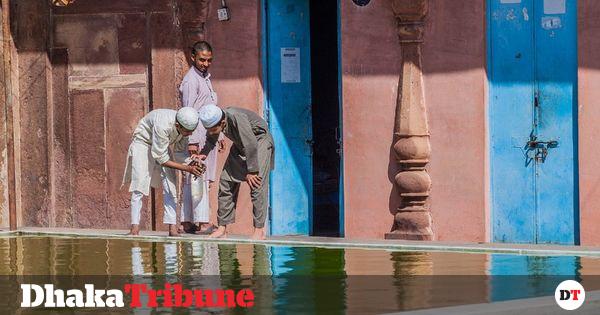India, like Bangladesh, has found unique ways to resolve issues regarding minority communities
In the recent years, there has been much debate about secularism in India, which for some like its democratic credential is apparently in permanent decline. Like the apocryphal scientific assessment that proves that the bumblebee ought not to fly, there is no shortage of friends and foes who seem to be constantly seeking confirmation of their convoluted conviction that secular and democratic values are eroding in India.
Some even tend to conclude that in a large developing nation with one large majority religious group, the life of several minority groups in India must be akin to that of a Muslim in an Uighur concentration camp in China, or Christians in Pakistan, whose religious structures are routinely vandalized, women are harassed and where members of minority communities live in an environment of heightened faith-based persecution.
Sadly for such merchants of doom, the reality is different.
It is in the DNA of the nation that a billion plus people of different religious, linguistic, and ethnic identity co-exist peacefully, and live in social harmony. For 74 years, irrespective of the political dispensation in power in New Delhi, distinguished persons from India’s many minority communities — no matter the size — have risen to powerful positions in the government, the armed forces, the parliament, business and non-government sector; even to the highest public offices of the land. This is a record that India’s neighbours or even many democracies of the West can find difficult to match.
This reality of India stands in sharp contrast to the ill-informed opinion piece by Brig Gen Qazi Abidus Samad published earlier in this newspaper with the title “Secularism goes beyond what’s written in the constitution.” Any country’s secular credentials can be judged with an unbiased mind. India’s well-known secular credentials may not be completely understood by an individual not accustomed to the variety, diversity, and plurality of thought, speech, and religious expression that Indian citizens cherish deeply and enjoy with the constitutional protection.
It has become a common habit of academicians, thinkers, and activists to bait young minds, especially those right across India’s borders, into thinking that India is becoming a hard-line orthodox country where religiosity takes precedence over secularism. The truth however is that no special status has been accorded to any religion in the constitution. India’s secularism is out in the open, and not masquerading under the garb of a deferential treatment to any state religion.
Its accommodating and accepting nature has led India to be a unique case in world history, as perhaps the only one to have a functional and vibrant democracy, despite having a multitude of diversities.
Brig Gen Samad’s patchy understanding of his neighbouring country and his patently untrue assertions about how Muslims feel in India perpetuate misconceptions about India. It has been mischievously claimed that Indian leadership don’t send out messages on festivals of different minority communities, while even India’s credentials of ‘Sabi dharme somo bhabhana’ has been questioned.
The notion that the communal situation in India is so disturbed that there is no space for Muslims to express themselves or even to conduct prayers using loudspeakers is manifestly — and audibly — false. If such was the case, there would have already been lively debates in the civil society space, as well as the issues would have been widely discussed in national, regional and social media sphere.
In the case of India, statistics relating to minorities in India, both in absolute and percentage terms, have witnessed a steady increase since India’s independence in 1947. Any honest assessment of such statistics for South Asia would show that India’s case is unique in the region. As per the findings of a recent survey on Religion in India by the reputed Pew Research Centre, 95% of Indian Muslims express great enthusiasm for Indian culture, 89% of Indian Muslims say they are very free to practice their religion, and 85% of Indian Muslims think Indian culture is superior to others. Now, if this does not give naysayers a pause, I doubt even common sense can.
The extent and geographical spread of targeted government social welfare schemes — at both the centre and state-level, are not limited to a single religious group or any one minority community among the many thriving in India. Else, India would not be able to showcase mainstreaming of youth from minority communities by getting into stable salaried jobs in public and private sectors, becoming entrepreneurs, and securing ranks in prestigious government recruitment examinations with the motivation to serve the nation.
That said, I agree with Brig Gen Samad’s proposition that “it is more important how the citizens perceive things and how their government behaves, for the government to earn the actual credentials within a society — secular or not so secular.” This applies as much to India as it does to other countries in South Asia, including Bangladesh. To be fair, both India and Bangladesh have found their unique ways to resolve issues relating to concerns of minority communities, in a spirit of consultation and reconciliation. And the result is there for all to see.
Both India and Bangladesh have been on a similar development curve; it is indeed a matter of pride for Indian friends of Bangladesh that it has outperformed all South Asian countries on several social parameters. But to think that the secularism model of one is better than the other in this case is manifestly and statistically not true.
As a “practicing” Indian, I humbly advise Brig Gen Samad and others who share his modest levels of knowledge about India to visit the country again, to travel the length and breadth of India, to interact with people of all religious and linguistic identity, especially India’s youth, and then judge for himself whether the India he portrays in his writings is what India really is.
Arindam Mukherjee is Director, Institute of Social and Cultural Studies (ISCS), India.

